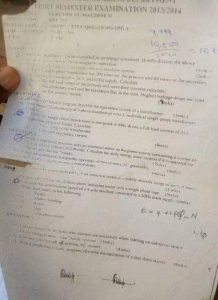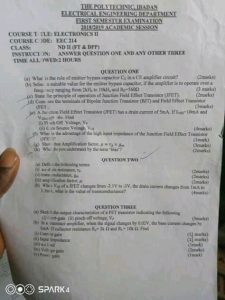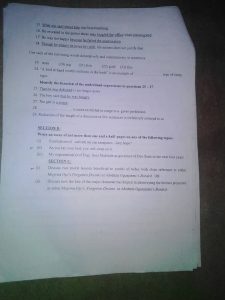mathematics
COURSE CODE: EEC 219
COURSE TITLE: circuit theorem 1
CLASS: ND2 , ELECTRICAL ENGINEERING
circuit theorem for nd2
ELECTRICAL CIRCUIT THEORY EEC 219 for nd2 electrical polytechnic
Circuit Theorem
QUESTION ONE
a)With a well labelled diagram, define the following terms as used in the electrical circuit.
1)Branch :Represent a single element such as a voltage source or a resistor.In other words a branch represents any two terminal element
Using a well labelled diagram we have
(Diagram)
In the figure above we have five branches, namely 10-v voltage source, the 2-A current source and the three resistor’s
A node is the point of connection between two or more branches. A node is usually indicated by a dot in a(C) circuit, if a short circuit (a connecting wire)connects two node’s the two node’s constitute a single node .
The circuit has three node’s a, b and c.Observe that the three point that form node b are connected by perfect conduction wire and therefore constitute a single point.The same is true of the four points forming node c.
For further study
A loop is any closed path in a circuit. A loop is a closed path formed by starting at a node, passing through a set of node’s and returning to the starting node without passing through any node more than once.
A loop is said to be independent if it contain at least one branch which is not a part of any other independent loop.
Mesh:Is a loop which does not connets in any other loop within it.
(Diagram).
[12/1, 3:17 PM] Deborah Typist: This is a circuit with two meshes, and paths abefa and bcdeb are meshes, but path abcdefa is not a mesh. The current through a mesh is called a mesh current
d))Short circuit :A short happens when a path of low resistance is connected (usually by mistake) to a component.
The resistor shown below is intended path for current,and the curved wire going round is the short.The wire shorts out the resistors by proving a low resistance path for current.
(Diagram)
b)Find the Norton,s equivalent circuit of figure below at terminal a and b
DIAGRAM
To find Rx,,we set the independent volt source equal to zero and connect a volt source of Vo= 1V(or any specified Vo to the terminal. We obtain of the figure above. We ignore the resistor because it is short circuited.Also due to the short circuit, the 5Ω(ohms) resistor the voltage source,and the dependent current source are all in parallel. Hence,Ix=0.At node a ,ix=1v/5(ohms) = 0.2A and RN =Vo/io=1/0.2=5Ω( (ohms)
Io=1xx/5=1/5=0.2A
RN=Vo/Is = 1/0.2=5(ohms)
To find IN we short circuit terminals a and b and find the current Isc, as indicated in the figure above. Note from this figure that the 4(ohms) resistor,the 10-v voltage source, the 5 ohms resistor,and the dependent source are all parallel. Hence,
Ix= V/R=10/4= 2.5A
At node a KCL gives Isc= 10/5+2Isc
Im = TA
(Diagram)
[12/1, 3:18 PM] Deborah Typist: Question 2
- a) Explain Nodal Analysis,prove a general procedure for analyzing circuit using node voltages as the circuit variables.
B)For the circuit in figure. (1) 2(a),find i1 to i4 using mesh analysis
(Diagram)
Solution
Note that meshes 1 and 2 from a supermesh since they have an independent current source that is common. Also meshes 2&3 form another super mesh because they have an dependent current source common.The two super meshes intersects and form a larger super mesh as shown.Applying Kvl to the larger super mesh











gralion torile –
I will immediately snatch your rss feed as I can not in finding your email subscription hyperlink or e-newsletter service. Do you have any? Kindly permit me know so that I may just subscribe. Thanks.
Emperorelectricalworks –
Yes we have